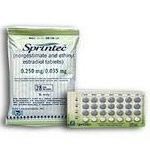Blue Tablet
Active Ingredients:
Norgestimate (0.25mg), Ethinyl Estradiol (0.035mg).
Inactive Ingredients:
Anhydrous lactose, FD&C blue no. 2 aluminum lake, lactose monohydrate, magnesium stearate, pregelatinized starch.
White Tablet
Contains Only Inert Ingredients:
Anhydrous lactose, hydroxypropyl methylcellulose 2208, magnesium stearate, microcrystalline cellulose.
The list of ingredients above is provided for informational purposes only. Always check the actual product label in your possession for the most accurate ingredient information due to product changes or upgrades that may not yet be reflected on our web site.
 Acne.org Products
Acne.org Products